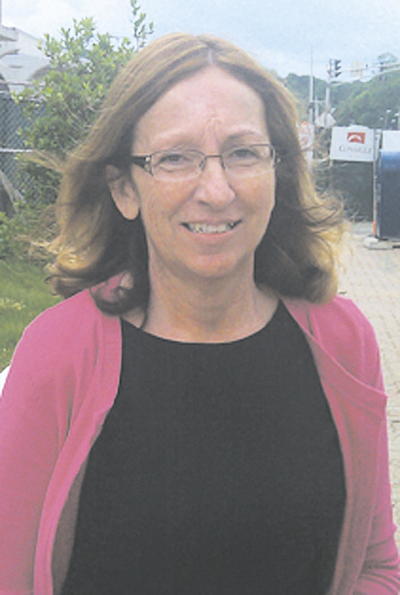BANGOR — In Carole Swan’s own words, her life was devastated by an injury at her job with the U.S. Postal Service in the 1990s.
“I do not work, I cannot work. I cannot even clean my own house or blow dry my hair. I cannot ride horses. I cannot have a garden, I cannot play ball with my children. I cannot go boating. Sometimes I cannot even get meals for my family. I have to have injections for pain and medications. I am left with only injuries that I cannot pay for. This has changed my life.”
The former Chelsea selectwoman wrote those words and similar ones on forms confirming to a federal benefits program that she was not working, even in a volunteer capacity.
Those statements contrast sharply with testimony that she was active in Chelsea politics and business, including scrambling down the sides of the Windsor Road culvert to inspect a washout in 2007, as well as doing banking and taxes for Marshall Swan Construction, the business she told people she co-owned.
Friday was the 10th day of Swan’s U.S. District Court trial on multiple charges of defrauding federal programs, including the Federal Workers’ Compensation Program.
In some years, Swan noted on her benefits applications that she received a $3,000$4,000 stipend for being a Chelsea selectwoman and spent about one and a half hours every other week in that capacity.
And in 1999 and 2000, she reported she was involved in a harness racing business in name only, that it was operated by her brother in Ohio, and that she had no contact with those horses.
“I do not go near them,” she wrote.
A 3,300-plus page record kept by the Office of Workers’ Compensation Program that contained a description of Swan’s injuries, medical treatment records and her self-reported earning capacity and income was the focus of testimony Friday.
Swan is accused of defrauding that program between 2008 and 2011 by failing to disclose her ownership in Marshall Swan Construction, as well as money she allegedly extorted from Whitefield contractor Frank Monroe.
Between August 2006 and May 2011, Swan received just less than $205,000 in federal workers’ compensation benefits, according to Joan Densberger, senior claims examiner with the Office of Workers’ Compensation Program. Swan netted benefits of about $3,600 every 28 days, Densberger calculated.
Densberger testified receipt of those benefits likely would have been affected if the department was aware Swan had the ability to work and was receiving other income.
Densberger said that after she reviewed the voluminous records and listened to the previous nine days of testimony, she viewed Carole Swan as working as a bookkeeper and doing banking for Marshall Swan Construction, acting as road supervisor and assessor for the town of Chelsea, and being responsible for supervising town personnel, among other activities.
“It appears from the testimony she was a very active person, doing quite sophisticated work,” Densberger said.
Swan received federal benefits on the basis she was totally disabled as a result of a right shoulder injury suffered Nov. 12, 1997, while working as a rural mail carrier for the U.S. Postal Service. She also previously received workers’ compensation after injuring her right arm unloading a box of books at work several years earlier.
Those same records show Swan briefly returned to light duty work sorting mail for several months before November 2003.
As a dozen witnesses called by the defense waited in the anteroom, Swan’s attorney Leonard Sharon questioned Densberger about the claims review process, referring to hand-printed notes signed by Swan indicating she was unsure whether she was answering the forms questions correctly.
Sharon also pointed out an agency decision showing that Swan’s selectman’s stipend was not to be used to reduce her benefits.
Earlier Friday, Sharon sought to prevent the jury from hearing Densberger’s opinion that Swan misrepresented her work capacity and failed to disclose income and activities on her applications for federal workers compensation.
As testimony began in the morning, Swan appeared to be injured.
As she and her attorneys came into the courtroom, she walked stiffly and slowly, almost dragging one leg. At the end of the day, Sharon held her hand as she hobbled out of the courtroom.
She had no trouble walking on Thursday when proceedings concluded midafternoon.
Sharon did not say what was wrong when asked.
Testimony began a half-hour later than usual Friday, with U.S. District Court Chief Judge John A. Woodcock telling the jury, “We were able to solve some legal issues so the trial should move more quickly.”
Also Friday, David Lajoie, an Internal Revenue Service agent, testified that Carole and Marshall Swan owe $145,404 in income and self-employment tax on $571,350 of unreported income received by Marshall Swan Construction between 2006 and 2010, the years Carole Swan is accused of falsifying federal income tax returns by underreporting that income.
The Swans filed joint returns those years.
Marshall Swan is charged with the same income tax fraud charges, as well as aiding and abetting fraud on a program receiving federal money. His trial is set to start Oct. 8 in the same court.
Carole Swan also faces three charges of Hobbs Act extortion for allegedly accepting money from Monroe for giving him town contracts. Those too will be the subject of a separate trial. Sharon said earlier that Swan would like to testify in her own defense in that case.
He has yet to say whether she will testify at the current trial.
The defense portion of the case is expected to start next week.
Betty Adams — 621-5631
badams@centralmaine.com
Send questions/comments to the editors.





Comments are no longer available on this story